Jesus used parables to teach people about the Kingdom of God, forgiveness, love, praying, repentance, and more. A parable can be described as an earthly story with a heavenly meaning or lesson.[1] Jesus used examples from the world to illustrate His points.
Presented below are free Bible study guides in PDF format that we will be using over the next several weeks as we progress through our Parables of Jesus Bible Studies.
Study Guides
A Study Guide of the Parables of Jesus edited by David Webb
Parables of Jesus by J.S. Smith
Parables Study Guides by Robert B. Kruschwitz
The Parables of Jesus by Mark A. Copeland
Contents
Week Three – The Wheat and the Tares
Week Seven – The Hidden Treasure
Week Eight – The Pearl of Great Value
Week One – Introduction to the Parables
Outline
- Opening prayer
- Introduction to the parables, definitions, and purpose
- Chronological order and classification of the parables
- The Kingdom of Heaven
- Closing prayer
Prayer
Almighty God,
we thank you that in times past you spoke to your people
and led them through a wilderness.
Shed light on our path and lead us by your Spirit,
for without your guidance
we will surely lose our way.
Bless now the hearing of the parables.
Give us ears to hear,
and hearts to respond.
Through Christ our Lord we pray. Amen.
Introduction
According to J.S. Smith, one of the authors of our study guides above, parables of Jesus are “among the greatest and most picturesque lessons in all His ministry” and they were used to “hide deeper knowledge from those unprepared for it.”
When asked why He was teaching in parables, Jesus responded in Matthew 13:10-17: [2]
10 Then the disciples came and said to him, “Why do you speak to them in parables?” 11 And he answered them, “To you it has been given to know the secrets of the kingdom of heaven, but to them it has not been given. 12 For to the one who has, more will be given, and he will have an abundance, but from the one who has not, even what he has will be taken away. 13 This is why I speak to them in parables, because seeing they do not see, and hearing they do not hear, nor do they understand. 14 Indeed, in their case the prophecy of Isaiah is fulfilled that says:
“‘“You will indeed hear but never understand,
and you will indeed see but never perceive.”
15 For this people’s heart has grown dull,
and with their ears they can barely hear,
and their eyes they have closed,
lest they should see with their eyes
and hear with their ears
and understand with their heart
and turn, and I would heal them.’16 But blessed are your eyes, for they see, and your ears, for they hear. 17 For truly, I say to you, many prophets and righteous people longed to see what you see, and did not see it, and to hear what you hear, and did not hear it.
Smith’s Bible Dictionary – Parable

Application
- Together, read and discuss the preface and charts one and two from Booth’s study guide, for the purpose, order, and classification of the parables.[3]
- Complete Lesson One in Copeland’s guide, “Introduction To The Parables (Mt 13:1-3,10-17).”
The Kingdom of Heaven
Is the Kingdom of God the same as the Kingdom of Heaven? Jesus used the two phrases interchangeably in Matthew 19:23-24:[4]
23 And Jesus said to his disciples, “Truly, I say to you, only with difficulty will a rich person enter the kingdom of heaven. 24 Again I tell you, it is easier for a camel to go through the eye of a needle than for a rich person to enter the kingdom of God.”
What is the difference between the Kingdom of God and the Kingdom of Heaven?
Application
- Complete Lesson Two in Copeland’s guide, “Defining The Kingdom Of Heaven (Mt 13:11).”
Closing Prayer
Lord, we thank you for the blessing of reading your Word together.
We ask that these Words of life, truth and hope would continue to impact us in the week ahead.
May your love and grace follow each of us as we return to our daily lives, refreshed and blessed by You.
We ask all this in the wonderful name of Jesus.
Amen.

Week Two – The Parable of the Sower
Outline
- Opening prayer
- Highlights from last week
- Introduction
- Read Matthew 13:1-9, 18-23
- Parable of the Sower lesson
- Closing prayer
Opening Prayer
Almighty God,
We gather together in Your presence with expectation, hungry for an encounter with You, eager to hear Your Word.
Open our eyes and ears to the presence of Your Holy Spirit. May the seeds of Your Word scattered among us today fall on fertile soil.
May they take root in our hearts and lives, and produce an abundant harvest.
We pray this in the name of Jesus Christ, our Teacher and our Lord.
Amen.
~ Christine Longhurst
Highlights From Last Week
- Parables can be thought of as an earthly story with a heavenly message
- Parables concealed the truth from people who lacked faith or understanding and fulfilled prophecy from the book of Isaiah concerned a dull-hearted people whose “spiritual lethargy rendered them unable to learn.” (Matt 10:10-13)
- They differ from fables and myths in that animals are not used and the lessons are heavenly in nature (Matt 13:24, 31, 33, 44, 45, 47)
- The Kingdom of God, known also as the Kingdom of Heaven, is a spiritual place where God reigns, and is both present (Col 1:12-14, Rev 1:4-9) and future (1 Corinth:24, 2 Peter 3:13, Matt 7:21-23)
- Since Pentecost (Acts 2:29-33), the Kingdom of Heaven now is visibly manifested in the Lord’s church (1 Co 15:23-26, Eph 1:20-22, 1 Peter 3:22, Rev 1:5)
Introduction
According to Wikipedia, the Parable of the Sower (sometimes called the Parable of the Soils) is a parable of Jesus found in Matthew 13:1–23, Mark 4:1–20, and Luke 8:4–15. In Mark’s Gospel and Matthew’s Gospel, this parable, the explanation of the purpose of parables and the explanation of the parable itself form part of Jesus’s third or “Parabolic” discourse, delivered from a boat on the Sea of Galilee. In each narrative, Jesus used the boat as a means of being able to address the huge crowd gathered on the lake shore. Luke’s Gospel does not use a boat for the delivery of the sermon, but still has Jesus presenting the parable to a large crowd gathered from ‘every city’ and follows the parable with a question on the purpose of parables and an explanation of the parable of the sower itself. [5]
Application
Read the Introduction for Lesson One from Booth’s guide.
Read the parable from Matthew 13:1-9:[6]
1 That same day Jesus went out of the house and sat beside the sea. 2 And great crowds gathered about him, so that he got into a boat and sat down. And the whole crowd stood on the beach. 3 And he told them many things in parables, saying: “A sower went out to sow. 4 And as he sowed, some seeds fell along the path, and the birds came and devoured them. 5 Other seeds fell on rocky ground, where they did not have much soil, and immediately they sprang up, since they had no depth of soil, 6 but when the sun rose they were scorched. And since they had no root, they withered away. 7 Other seeds fell among thorns, and the thorns grew up and choked them. 8 Other seeds fell on good soil and produced grain, some a hundredfold, some sixty, some thirty. 9 He who has ears, let him hear.”
And Jesus’ explanation in Matthew 13:18-23:
18 “Hear then the parable of the sower: 19 When anyone hears the word of the kingdom and does not understand it, the evil one comes and snatches away what has been sown in his heart. This is what was sown along the path. 20 As for what was sown on rocky ground, this is the one who hears the word and immediately receives it with joy, 21 yet he has no root in himself, but endures for a while, and when tribulation or persecution arises on account of the word, immediately he falls away. 22 As for what was sown among thorns, this is the one who hears the word, but the cares of the world and the deceitfulness of riches choke the word, and it proves unfruitful. 23 As for what was sown on good soil, this is the one who hears the word and understands it. He indeed bears fruit and yields, in one case a hundredfold, in another sixty, and in another thirty.”
Complete Copeland’s Parable of the Sower Lesson.
Read “The Lesson” from page 10 of Booth’s guide. If there is time, consider some of the points made in the other guides posted above for the Parable of the Sower lessons.
Closing Prayer
Father,
Thank You that You have revealed Your love to us today.
We invite You to send us out from here in the power of the Holy Spirit. Fan into flame the gifts that you have given us, come reveal Your grace and truth to us each day.
For Yours is the Kingdom, the power and the glory, forever and ever. Amen.
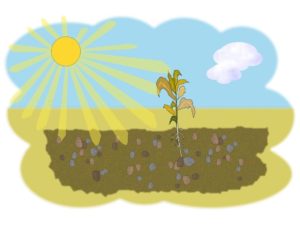
Week Three – The Wheat and the Tares
Highlights From Last Week:
- Jesus talks about four different types of soil or ground in the Parable of the Sower, each representing four different attitudes towards the Word of God. (Matthew 13:1-9)
- The seed in the parable represents the Word of God, the soil represents the attitude of the listener, and the sower is Jesus or anyone who is trying to spread the truth of the gospels. (Matthew 13:18-23)
- The soil on the path represents people who have heard the Word, but do not understand it or care to understand it, the stone soil represents those who responded to the gospel at one time but are not being grounded in faith, and the thorny soil represents people who hear the Word but are preoccupied with the cares and riches of this world. The truth of the gospel is at risk of being lost in all of these cases.
- The fourth soil represents the person who hears the Word, and it blossoms in their heart, and they begin a new life with Jesus. (Isaiah 43:18-19, 2 Corinthians 5:17, 2 Corinthians 3:6, Romans 6:4)
Outline
- Opening prayer
- Introduction
- Read Matthew 13:24-30, 36-43
- Complete Copeland’s “The Wheat and Tares” lesson
- Closing prayer
Opening Prayer
Father, please help us to understand the truth, as we hear it proclaimed, and help us to hear the voice of our Savior. Give us ears to hear and receive your Word, perhaps for the first time, and to rest on Jesus as He is offered to us in the Gospel. In His name we pray, amen.
Introduction
The Parable of the Wheat and the Tares, or Parable of the Weeds, is also found in Matthew 13, however unlike the Parable of the Sower, this one is only found in Matthew. This parable is often misinterpreted.
Read the Introduction in Booth’s guide.
Read the parable in Matthew 13:24-30:[7]
He put another parable before them, saying, “The kingdom of heaven may be compared to a man who sowed good seed in his field, 25 but while his men were sleeping, his enemy came and sowed weeds among the wheat and went away. 26 So when the plants came up and bore grain, then the weeds appeared also. 27 And the servants of the master of the house came and said to him, ‘Master, did you not sow good seed in your field? How then does it have weeds?’ 28 He said to them, ‘An enemy has done this.’ So the servants said to him, ‘Then do you want us to go and gather them?’ 29 But he said, ‘No, lest in gathering the weeds you root up the wheat along with them. 30 Let both grow together until the harvest, and at harvest time I will tell the reapers, “Gather the weeds first and bind them in bundles to be burned, but gather the wheat into my barn.”’”
And Jesus’ explanation in Matthew 13:36-43:
36 Then he left the crowds and went into the house. And his disciples came to him, saying, “Explain to us the parable of the weeds of the field.” 37 He answered, “The one who sows the good seed is the Son of Man. 38 The field is the world, and the good seed is the sons of the kingdom. The weeds are the sons of the evil one, 39 and the enemy who sowed them is the devil. The harvest is the end of the age, and the reapers are angels. 40 Just as the weeds are gathered and burned with fire, so will it be at the end of the age. 41 The Son of Man will send his angels, and they will gather out of his kingdom all causes of sin and all law-breakers, 42 and throw them into the fiery furnace. In that place there will be weeping and gnashing of teeth. 43 Then the righteous will shine like the sun in the kingdom of their Father. He who has ears, let him hear.
Application
Read (or listen to) What is the Parable of the Wheat and the Tares?
Complete “The Wheat and the Tares” in Copeland’s guide.
Read “The Lesson” in Booth’s guide.
Closing Prayer
O Lord, we bless You for the Lord Jesus who is a perfect Redeemer and we pray, O Lord, that You would teach us to trust Him, to rest upon and cling to Him, and in doing so help us to be sure that our destiny will not be the furnace of divine wrath, but joy in the presence of the brilliant radiance of the Son of Your love, whose character we will be made fully to reflect on the great and final day. In Jesus’ name, amen.[8]
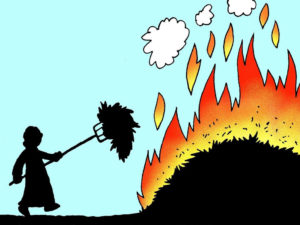
Week Four – The Growing Seed
Outline
- Opening prayer
- Highlights from last week
- A note about the crowds
- Introduction to the Growing Seed
- Read Mark 4: 26-29
- Complete the Growing Seed lesson
- Closing prayer
Opening Prayer
O Lord my God,
Teach my heart this day,
where and how to find you.
You have made me and remade me,
and you have bestowed on me all the good things I possess,
and still, I do not know you.
I have not yet done that for which I was made.
Teach me to seek you,
for I cannot seek you unless you teach me,
or find you unless you show yourself to me.
Let me seek you in my desire;
let me desire you in my seeking.
Let me find you by loving you;
let me love you when I find you. Amen. (St Anselm of Canterbury)
Highlights From Last Week
- In the Parable of the Weeds, or Wheat and Tares, we learned that in our world, we are surrounded by people who are of God and people who are of the devil, and we must coexist until Jesus returns with His angels to “reap the harvest” of His flock. (Matthew 13:37-39)
- The evil ones will be separated from the good, and the evil will be burned, there will be weeping and gnashing of teeth, and all causes of sin will be removed. (Matthew 13:42)
- At that time we will have an abundant entrance “into the everlasting kingdom of our Lord and Savior Jesus Christ” and “then the righteous will shine forth as the sun in the kingdom of their Father.” (2 Peter 1:11, Matthew 13:43)
A Note About the Crowds
Even though the parable for this week, the Growing Seed, or the Seed Growing in Secret, does not appear in Matthew along with the other parables we have studied so far, it does appear to have taken place at around the same time, while Jesus was teaching at the seaside. We are told over and over again in the Bible about the crowds of men and women who seemed to always want to be around Jesus. How did He feel about these crowds of people? While many may feel like they want to run from crowds of people, Jesus instead had compassion on them.
Read Jesus’ Teaching and the Crowds.
Introduction to the Growing Seed
This parable is only found in the gospel of Mark, following his account of the Parable of the Sower, and can be thought of as what happens when the seed falls on the “good soil.”
Read the introduction in Booth’s and Webb’s guides.
Read Mark 4:26-29: [9]
26 And he said, “The kingdom of God is as if a man should scatter seed on the ground. 27 He sleeps and rises night and day, and the seed sprouts and grows; he knows not how. 28 The earth produces by itself, first the blade, then the ear, then the full grain in the ear. 29 But when the grain is ripe, at once he puts in the sickle, because the harvest has come.”
Read What is the meaning of the Parable of the Growing Seed (Mark 4:26-29)?
Application
Complete “The Growing Seed” in Copeland’s guide.
Read the “Lesson” in Booth’s guide, and consider question #10 on page 4 of Smith’s guide about spiritual growth.
Closing Prayer
Dear Lord, I confess that sometimes I hear your Word and get excited about the ideas presented, only to fail to follow through when the opportunity to live it out appears. But you promise not to leave me to work out this life of faith in my own strength. You empower me with your very own Holy Presence through your Spirit. Lord, forgive me that I settle on less than your best when I rely on my own understanding instead of your accessible wisdom and discernment. It is by grace through faith I have been redeemed and by the same faith I will walk by your power. Thank you all things are possible in the name of Jesus. Amen.[10]
Week Five – The Mustard Seed
Outline
- Opening prayer
- Highlights from last week
- Introduction to the Mustard Seed
- Read Matthew 13:31-32
- Complete the Mustard Seed lesson
- Closing prayer
Opening Prayer
O God Almighty, the Father of Thy Christ, Thy only begotten Son, give me a body undefiled, a heart pure, a mind watchful, an unerring knowledge, the influence of the Holy Ghost for the obtaining and assured enjoying of the truth, through Thy Christ, by whom glory be to Thee, in the Holy Spirit, for ever. Amen. — Apostolic Constitutions, from Prayers of the Early Church by J. Manning Potts.
Highlights From Last Week
- In the Parable of the Growing Seed, or Seed Growing in Secret, we learned that the Word of God grows within us gradually and in stages, according to the secret power of God. (Mark 4:26-29)
- Jesus probably told this parable, along with the Mustard Seed and Leaven, in order to encourage people after the more dismal messages of the earlier parables.
- The seed must be sown in order for there to be a harvest, and patience is required while the seed grows.
- We also learned about how Jesus had compassion on the crowds who followed him. Read the introduction of Chapter 19 in Jesus the Christ by James E. Talmage.
Introduction to the Mustard Seed
This is a very famous parable that is once again found in Matthew, Mark, and Luke. Jesus taught this parable to illustrate that the Kingdom of Heaven may start out small, however it is destined for tremendous growth.
Read the introductions in Webb’s and Booth’s guides.
Read Matthew 13:31-32:
31 He put another parable before them, saying, “The kingdom of heaven is like a grain of mustard seed that a man took and sowed in his field. 32 It is the smallest of all seeds, but when it has grown it is larger than all the garden plants and becomes a tree, so that the birds of the air come and make nests in its branches.”
Jesus also used the analogy of a mustard seed in Luke 17:6:
And the Lord said, “If you had faith like a grain of mustard seed, you could say to this mulberry tree, ‘Be uprooted and planted in the sea,’ and it would obey you.
The Parable of the Mustard Seed
What is the meaning of the Parable of the Mustard Seed?
Meaning of Mustard Seed Parable
Can Faith Really Move Mountains?
Application
Complete “The Mustard Seed” in Copeland’s guide.
Read the “Lesson” in Booth’s guide.
Closing Prayer
Blessed be the God and Father of our Lord Jesus Christ, which according to his abundant mercy hath begotten us again unto a lively hope by the resurrection of Jesus Christ from the dead, to an inheritance incorruptible, and undefiled, and that fadeth not away, reserved in heaven for us. Keep us by the power of God through faith unto salvation; that the trial of our faith, being much more precious than of gold that perisheth, though it be tried with fire, might be found unto praise and honour and glory at the appearing of Jesus Christ. Amen. — Adapted: First Peter 1:3-7, from Prayers of the Early Church by J. Manning Potts.
Week Six – The Leaven
Outline
- Opening prayer
- Highlights from last week
- Introduction to the Parable of the Leaven
- Read Matthew 13:33
- Complete the Leaven lesson in Copeland’s guide
- Closing prayer
Opening Prayer
Heavenly Father, we thank you for all of the amazing things that you have done for us today. Thank you for making it possible for all of us to gather together. Thank you for revealing your love and truth in you. We are blessed to be able to gather together and read your words. Sow your words in our hearts today so that they may grow and blossom. Help your words to take root so that we can follow your path in life. As we learn more of your teachings, walk with us and help us to live in your unending love. For yours is the kingdom, the power and the glory, now and forever. Amen. [11]
Highlights From Last Week
- In the Parable of the Mustard Seed, we learned that the kingdom of heaven is destined for great things, though its beginning was small. (Matthew 13:31-32)
- Those who will abide in Christ can be used by Him to produce the remarkable growth in the Kingdom illustrated by this parable. (Philippians 4:13)
Introduction to the Parable of the Leaven
This parable appears in Matthew and Luke, and highlights the growth of the Kingdom of Heaven within.
Read the introductions in Booth’s and Webb’s guides.
Read Matthew 13:33 [12]
33 He told them another parable. “The kingdom of heaven is like leaven that a woman took and hid in three measures of flour, till it was all leavened.
Read What is the meaning of the Parable of the Leaven?
What Is Jesus’ Parable of Leaven About?
What is the meaning of the parable of the leaven?
Application
Complete “The Leaven” on page 21 of Copeland’s guide.
Read the “Lesson” in Booth’s guide.
Closing Prayer
Heavenly Father, thank you for your love, thank you for allowing us to come before you through the name of our Lord Jesus, thank you for bringing us together and thank you for the Bible study we have just had. Thank you for increasing in us the knowledge of truth,may the Holy Spirit guide and help us to continue understanding what is your will, may your name be glorified now and forever. In Jesus’ name we pray and believe. Amen.
Check out the following great free books about parables from Project Gutenberg:
The Parables of Our Lord by William Arnot
The Parables of the Saviour by Anonymous
Parables of the Cross by I. Lilias Trotter
Week Seven – The Hidden Treasure
Outline
- Opening prayer
- Highlights from previous sessions
- Introduction to the Parable of the Hidden Treasure
- Read Matthew 13:44
- Complete the Hidden Treasure lesson
- Closing prayer
Opening Prayer
Dear God, thank you for your amazing power and work in our lives, thank you for your goodness and for your blessings over us. Thank you that you are able to bring hope through even the toughest of times, strengthening us for your purposes. Thank you for your great love and care. Thank you for your mercy and grace. Thank you that you are always with us and will never leave us. Thank you for your incredible sacrifice so that we might have freedom and life.
Forgive us for when we don’t thank you enough, for who you are, for all that you do, for all that you’ve given. Help us to set our eyes and our hearts on you afresh. Renew our spirits, fill us with your peace and joy. We love you and we need you, this day and every day. We give you praise and thanks, for You alone are worthy!
In Jesus’ Name, Amen. (Debbie McDaniel)
Highlights From Previous Sessions
- Today’s parable, the Hidden Treasure, is the sixth of 32 parables that we have studied, leaving 26 more weeks of parables to cover.
- In the parables of the Sower and Wheat and Tares, we learned that there is only one type of “soil” that can receive the Kingdom of God and that we share the world with Satan and his children. Angels will separate the righteous from among the evil ones and all evil will be abolished.
- In the parables of the Growing Seed, Mustard Seed and Leaven, we learned about how the Kingdom of God had small beginnings but is destined for great growth and will fill the whole Earth.
- Today’s parable begins our next section of Kingdom parables, those which describe the tremendous value of God’s Kingdom.
Introduction to the Hidden Treasure
Watch the video from Lesson One of Treasure: Jesus is Worth Everything
Answer the Discover questions from the Treasure Discovery Guide.
Matthew 13:44: [13]
44 “The kingdom of heaven is like treasure hidden in a field, which a man found and covered up. Then in his joy he goes and sells all that he has and buys that field.
Application
Complete “The Hidden Treasure” on page 24 of Copeland’s Guide.
Read the “Lesson” in Booth’s guide.
Closing Prayer
Faith (St. Benedict)
Gracious and Holy Father,
give us the wisdom to discover You,
the intelligence to understand You,
the diligence to seek after You,
the patience to wait for You,
eyes to behold You,
a heart to meditate upon You,
and a life to proclaim You,
through the power of the Spirit of Jesus, our Lord. Amen.
Week Eight – The Pearl of Great Price
Outline
- Opening prayer
- Highlights from last week
- Introduction to the Pearl of Great Price
- Read Matthew 13:45-46
- Complete the Pearl of Great Price lesson
- Closing prayer
Opening Prayer
Lord, thank You for the people You have divinely placed in my life who speak holy truth, love and words of wisdom. Give me a heart of discernment to know when You are using someone to speak instruction into my heart and my circumstances, and give me the strength and courage to follow through with that advice, even when it’s hard. Fill me with peace in knowing that even if I take a wrong turn, Your purpose will prevail. In Jesus’ Name, Amen.[14]
Highlights From Last Week
- Last week we did the first session from Treasure: Jesus is Worth Everything, which begins with the parable from last week, the Hidden Treasure. Consider the questions below the video if you didn’t have a chance to do that last week.
- The Treasure unit is a story-based discovery experience designed to draw us closer to Jesus.
Introduction to The Pearl of Great Price
This is the second parable Jesus used to describe the immeasurable value of the Kingdom of God.
Read the Introductions in Booth’s and Webb’s guide.
Read Matthew 13:46-48: [15]
45 “Again, the kingdom of heaven is like a merchant in search of fine pearls, 46 who, on finding one pearl of great value, went and sold all that he had and bought it.
Read “The Worth of the Kingdom” on page 5 of Smith’s guide.
What is the meaning of the Parables of the Hidden Treasure and the Pearl of Great Price?
Application
Complete “The Hidden Treasure” on page 24 of Copeland’s guide.
Read the “Lesson” in Booth’s guide.
Hymn
O That Pearl of Great Price
Composer: Andrew L. Skoog
Week Ten – The Householder
Outline
- Opening prayer
- Highlights from last week
- Introduction to the The Householder
- Read Matthew 13:51-52
- Complete the lessons
- Closing prayer
Opening Prayer
Kind and gracious Lord, you are the creator of all things, the author of life, and our loving Father. We thank you for your faithful presence in our lives, and we thank you for the Word of God.
As we prepare to study your Word together, we ask you to open our minds. Help us clear away the clutter and quiet any outside voices so we can hear only what you long to speak to us.
Please provide fresh insights and awareness. As a people, God, we can be stubborn, arrogant, and closed-minded. We can sometimes act like and even believe that we already know it all. We don’t.
We need you to open our minds so we can understand you, your Holy Word, and your will for our lives. In Jesus’ precious name we pray. Amen. [21]
Highlights from Last Week
- With the help from a clip from the series The Chosen, we studied the Parable of the Dragnet. [22] The clip also included Jesus speaking the words from this week’s parable.
- In the Parable of the Dragnet, Jesus taught that the gospel is for everyone and that He extends His invitation to all.
- The Gospel will draw all kinds of people, some will be good and some will be bad.
- In the day of judgement there will be a separation of the good and the bad.
Introduction to The Householder
This is the last lesson that Jesus taught in Matthew 13, and as mentioned last week, the next part of Matthew 13, starting at verse 54, marks a major new emphasis in Matthew’s narrative as Jesus’ messianic identity is increasingly clarified. True disciples grow in understanding in both the “new” revelation of Jesus and how He fulfills the promises of the Old Testament.
Read Matthew 13:51-52:
51 “Have you understood all these things?” They said to him, “Yes.” 52 And he said to them, “Therefore every scribe who has been trained for the kingdom of heaven is like a master of a house, who brings out of his treasure what is new and what is old.”
Read the Introduction on page 28 of Webb’s guide.
What Does It Mean That Jesus Came to Fulfill Scripture?
How Can We Store up Treasures in Heaven?
Application
Complete the lessons for this parable in Copeland’s guide (page 34) and Webb’s guide (page 28).
Closing Prayer
Lord, your Word is a lamp to our feet and a light to our path. Thank you that we can live in Your light and walk in Your truth. May the things that you have revealed and thoughts that we have shared dwell in our hearts and stir us to action. We ask all this in the precious name of Jesus. Amen. [23]
Featured image is from Good News Productions International and College Press Publishing. [24]
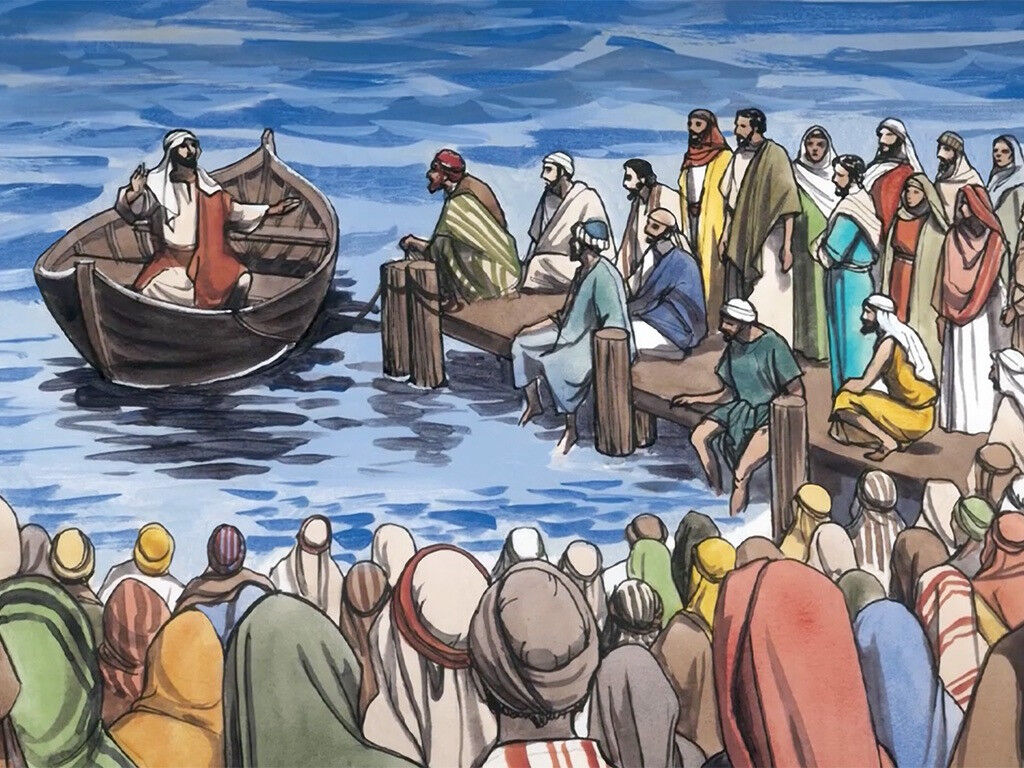
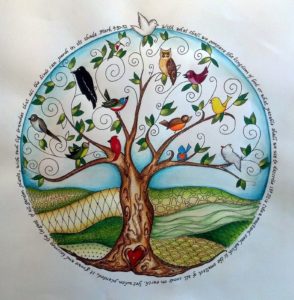
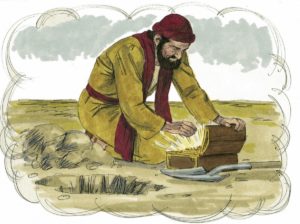

[…] Read the Introductions on page 32 of Booth’s guide, and page 30 of Webb’s guide.[3] […]
[…] Read the Introductions in Booth’s and Webb’s guides.[1] […]
[…] Complete the lesson in Copeland’s guide[1] […]